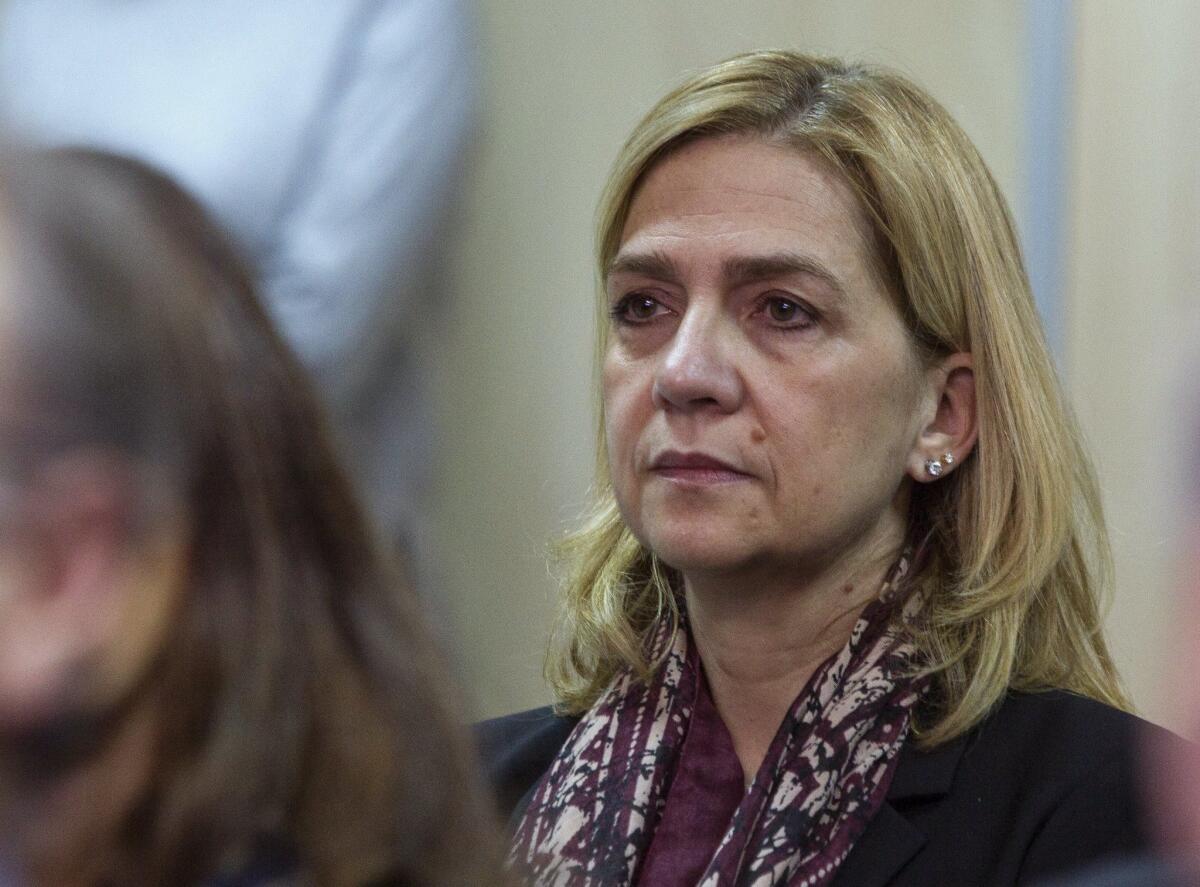Historic trial opens for Spain’s Princess Cristina, accused of tax fraud

Spain’s Princess Cristina listens to the proceedings during a corruption trial in a makeshift courtroom in Palma, capital of Mallorca, on Monday.
Reporting from Madrid — Spain’s Princess Cristina went on trial Monday on charges of tax fraud in a historic case heard on the Mediterranean island of Mallorca, not far from a royal palace where she used to vacation — and within view of the prison where she could end up.
Infanta Cristina de Borbon, 50, is one of King Felipe VI’s two older sisters. She and her Olympic medalist husband, Iñaki Urdangarin, are charged with defrauding Spanish tax authorities. They deny any wrongdoing.
They are among 18 defendants accused of helping to embezzle $6.5 million in public funds, mostly from Valencia and the Balearic Islands, through the Noos Foundation, a supposedly nonprofit sports foundation that Urdangarin ran. Lawyers for his former business partner, Diego Torres, asked the court Monday to call King Felipe and his elderly father, Juan Carlos, to the witness stand when testimony begins in February. A rival attorney said that would turn the trial “into a reality show.”
Cristina is the first Spanish royal charged or put on trial in a criminal case since the restoration of Spain’s monarchy after the death of Gen. Francisco Franco in 1975. Her legal woes have already marred her brother’s reign, fashioned as a fresh start in 2014, after a painful economic crisis that’s left more than 1 in 5 Spaniards still out of work.
At the trial’s opening, lawyers for the princess, together with a state attorney representing Spanish tax authorities, asked a three-judge panel to drop Cristina from the list of defendants, and reduce her penalty to an administrative fine. But under Spanish law, private parties can act as prosecutors, and Cristina’s charges were brought by a private anti-corruption group, Manos Limpias, or Clean Hands. Its lawyer, Virginia Lopez Negrete, argued that letting Cristina off would “prejudice Spanish justice and prejudice the crown.”
Under investigation for more than five years, the princess and her aristocrat-athlete husband have become symbols of corruption in Spain’s ruling elite, embodying the lavish lifestyle that many Spaniards dreamed of in the economic boom years, but found repugnant when the crisis hit. The couple sold their $7.5-million Barcelona mansion last year and now live in Switzerland. They spent their allegedly ill-gotten gains on home improvement projects, luxury vacations and private salsa lessons for them and their four children.
Cristina’s father, the former king, Juan Carlos, was credited with ushering Spain into democracy in the late 1970s but saw his popularity plummet after he went on a lavish elephant hunt in Africa in 2012. He abdicated in favor of his son, Felipe, two years later.
Although Spanish law has not changed, the economic crisis prompted Spanish tax authorities to step up their efforts to enforce current laws and prosecute tax fraud, experts say. That may be what netted Cristina.
“There was a political decision to fight tax fraud. They put more resources toward prosecuting these type of offenses. The state needed the money,” said Ignacio Sanchez, an attorney and white collar-crime expert at Hogan Lovells, a law firm with offices in Madrid.
Cristina faces up to eight years in prison if convicted of two counts of tax fraud. Urdangarin, charged with more serious crimes that include money laundering and forgery, faces up to 19 1/2 years.
A few anti-monarchy protesters waved flags of the 1930s Spanish Republic, and shouted at the couple as they left court together late Monday, passing through a police cordon and gaggle of photographers after a 13-hour court session. They were forced to sit apart in the defendants’ section inside the makeshift courtroom. They did not address the court.
The trial was moved from the regular courthouse in Palma, the capital of Mallorca, to a nearby training center for civil servants, to accommodate the large number of defendants, media and spectators. Parts of the trial aired on live TV across Spain.
In a working-class barrio on Madrid’s west side, over which Spain’s hilltop Royal Palace towers, retirees gathered under a wall-mounted TV at a chocolate and churros cafe.
“I think she’s a good person, but that husband — what a pity!” said Magdelena Rodriquez Prado, who came to watch with her sister Margarita, both in their late 60s. “I remember their beautiful wedding,” said Margarita. “They’re not in my glossy magazines anymore, though. They moved away.”
Cristina wed Urdangarin in 1997 at Barcelona’s cathedral, after the two met at the 1996 Summer Games in Atlanta. Afterward they became the duke and duchess of Palma de Mallorca. But Felipe stripped them of those titles last year, as public criticism grew.
Cristina remains sixth in line to the Spanish throne.
Her trial is expected to last through June.
Frayer is a special correspondent.
More to Read
Sign up for Essential California
The most important California stories and recommendations in your inbox every morning.
You may occasionally receive promotional content from the Los Angeles Times.









